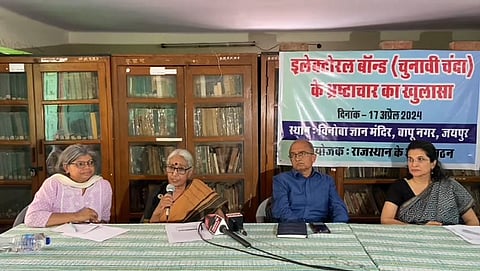
Jaipur- In a resolute stance against corruption within India's political financing system, a coalition of activists convened at a press conference in Jaipur on April 17. The event, held at Vinoba Gyan Mandir, brought together renowned figures in the realm of transparency and legal advocacy, including the esteemed activist and lawyer, Prashant Bhushan, and the relentless advocates for transparency, Aruna Rai and Anjali Bharadwaj among others.
The collective began by echoing the recent groundbreaking verdict delivered by the Supreme Court on February 15, 2024. They shed light on the implications of this verdict, which deemed the Electoral Bonds scheme unconstitutional and halted the further sale of such bonds.
Emphasizing the essence of democracy, the Supreme Court underscored the scheme's violation of voters' right to information under Article 19(1)(a) of the Constitution, striking a resounding blow against the veil of opacity shrouding political funding.
Delving into meticulous analysis and comprehensive data examination, the activists unveiled a myriad of disconcerting trends that epitomized systemic corruption and malfeasance within the Electoral Bonds scheme:
1. Enabling Extortion:
The coalition unearthed instances where corporations embroiled in investigations by enforcement agencies availed themselves of electoral bonds. Notably, they highlighted the case of Hyderabad-based businessman Sarath Reddy, ensnared in a legal quagmire with the Enforcement Directorate.
Despite facing the specter of legal ramifications, Reddy's company, Aurobindo Pharma Limited, orchestrated substantial donations to the BJP, thus raising suspicions of quid pro quo arrangements and undue influence exerted through electoral funding.
Kolkata-based IFB Agro Industries' Rs 92 crore electoral bond donation, with Rs 42 crore going to the Trinamool Congress, highlights the influence of tax and regulatory concerns on corporate contributions. The company's stock exchange filing cited the decision as being in the best interest of stakeholders. Additionally, a senior company official mentioned following government instructions at the 2023 AGM. This case underscores the complex factors guiding corporate political financing and the need for transparency in such transactions.
2. Quid Pro Quo Arrangements:
Drawing from a panorama of documented evidence, the activists revealed a symbiotic relationship between electoral bond donations and the bestowal of lucrative contracts or favorable policy decisions upon corporate entities.
Among the instances cited was the correlation between Megha Engineering and Infrastructure Pvt Ltd's substantial donation to the ruling party and its subsequent acquisition of a colossal tunnel project in Mumbai, indicative of a nexus between political contributions and pecuniary gains.
Scroll's investigation revealed that a Kotak group firm, Infina Finance Pvt Ltd, contributed Rs 60 crore to the BJP via electoral bonds. This donation aligns with significant RBI decisions concerning Kotak Mahindra Bank. Notably, Infina Finance Pvt Ltd donated Rs 25 crore in April 2021, just before the RBI announced new guidelines. These guidelines permitted Uday Kotak to remain as managing director and chief executive of Kotak for the next 32 months, despite his removal from the former position. This revelation raises questions about the timing of electoral bond donations in relation to regulatory decisions and underscores the need for scrutiny in corporate political contributions.
3. Money Laundering:
An in-depth investigation conducted by The Hindu uncovered a startling revelation regarding electoral bond transactions involving 33 companies. These entities collectively contributed a staggering ₹576.2 crore through electoral bonds, of which an alarming ₹434.2 crore, accounting for approximately 75%, found its way into the coffers of the BJP. What's particularly concerning is that these companies exhibited a disconcerting financial profile, with negative or near-zero profits after tax over a span of seven years from 2016-17 to 2022-23. The cumulative net loss incurred by these 33 companies surpassed a staggering ₹1 lakh crore.
Of even greater concern is the fact that a significant portion of these companies, precisely 16 out of the 33, reported either zero or negative direct taxes overall. Such a financial landscape raises profound questions about the authenticity of these entities' financial activities and the plausibility of their involvement in electoral bond transactions. The sheer magnitude of their donations, juxtaposed with their precarious financial standing, suggests a potential facade behind which illicit financial transactions may be concealed.
The investigative findings strongly hint at the possibility of these loss-making entities serving as conduits for funneling funds on behalf of other undisclosed entities or engaging in deliberate misrepresentation of financial data. Such actions not only cast a shadow of doubt on the integrity of electoral financing but also underscore the urgent need for robust regulatory scrutiny and enforcement mechanisms to stem the tide of potential money laundering activities.
4. Regulatory Inaction:
The coalition cast a glaring spotlight on instances where regulatory oversight ostensibly faltered in the face of electoral bond donations, thereby compromising public safety and regulatory integrity. Notable among these instances was the purported regulatory leniency extended to pharmaceutical companies entangled in quality control controversies following substantial contributions to political entities. This apparent quid pro quo arrangement, exemplified by the Gujarat-based Zydus Healthcare's electoral bond donation to the BJP amidst quality control lapses, underscored the insidious nexus between political financing and regulatory oversight.
In a clarion call for action, the activists vehemently advocated for the establishment of a court-monitored Special Investigation Team (SIT) tasked with delving into the labyrinthine web of corruption surrounding electoral bonds. They emphasized the imperative of holding accountable those complicit in perpetuating systemic malfeasance and safeguarding the sanctity of India's democratic institutions.
The press conference culminated in a unified pledge by the activists to persist in their crusade against corruption, vowing to champion transparency, accountability, and the paramountcy of democratic principles in India's electoral landscape.
You can also join our WhatsApp group to get premium and selected news of The Mooknayak on WhatsApp. Click here to join the WhatsApp group.